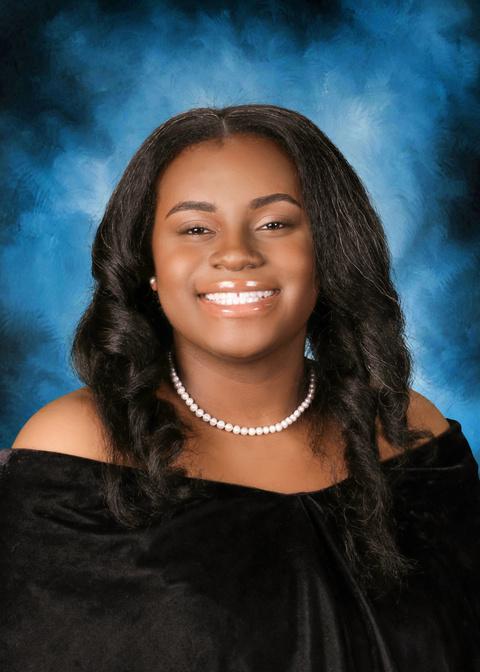THE SCHOLAR
BLUEPRINT TO SUCCESS PART 3 (COLLEGE EDITION)













BLUEPRINT TO SUCCESS PART 3 (COLLEGE EDITION)














Hello!
Welcome to another amazing edition of The Scholar: Blueprint to Success – Part 3. College is an amazing journey that you should take full advantage of. It is an opportunity to learn more about others, the world, and most importantly —you. I can recall the good—and bad—times of trying to figure out how I was going to survive classes, classmates, professors, a job and extracurriculars

I wish that there could have been a resource like this while in college. This blueprint to success is a cornerstone of continuing to develop life skills and talents that will help you personally and professionally. Take advantage of the advice and wisdom given I'm confident that your future self will appreciate it!
Here’s to another amazing semester,


My journey to becoming a college graduate and commissioned officer in the Army was not an easy one. Two days after my birth, my mother left me at a hospital in Jacksonville, FL. Fortunately, my maternal grandparents came and picked me up from the hospital and provided me with a loving home. Sadly, my grandparents died when I was just twelve years old. After the death of my grandparents I entered the foster care system, and the Foster Care System was a life-changing experience. Foster Care gave me a different outlook on life and it made me aware of the importance of education. It also taught me to be independent and when things get tough, to just keep pushing because you are all you have in the end. By trusting in God, keeping a positive spirit, and hard work, I got through the trials and tribulations. My advice to foster youth would be to set a goal
and a purpose for yourself and a plan to achieve it. Do not let anything get in the way of that plan and keep God and yourself first. I believe that where I’m from is not where I’m going, and my past does not determine who I am. I can happily say that with my perseverance I was able to graduate college debt free and I am now currently studying for a masters degree on a full scholarship. So, do not let foster care be your end story but instead your inspiration.
About Ms. Briana Bellamy, B.S. Briana Bellamy is a recent graduate of the University of West Florida. Passionate about volunteering with organizations that help current and former foster youth; in her free time, she enjoys reading about personal finance, real estate, and selfimprovement.
Graduating Florida high school seniors are eligible to apply based on the following criteria:
Have a 2.0 GPA (unweighted) or higher

Submit an unofficial high school transcript*



Submit 2 or more Letters of Recommendation
Submit the DJF Volunteer Form detailing 100 hours (minimum) of community service hours earned
Scholarship Deadline: January 31, 2024
Visit: www.djfoundationinc.org, to apply today!

Students must submit a formal application which includes a personal statement, detailing how the scholarship will help meet future college and professional career aspirations.

The DeBoles-Johnson Foundation, Inc. is proud to announce the Class of 2023 Scholarship Awardees.

1st Place Winner ($1000.00)
High School Attended: Florida State University Schools


College: Florida A&M University
Major/Minor: Broadcast Journalism/Graphic Design

Being a Class of 2023 DJF Scholarship recipient means that I will get to fully engage in the collegiate experience and further my journalism career. It also means that I have more time to focus on my academics instead of stressing over finances.
2nd Place Winner ($750.00)
High School Attended: James S. Rickards High School College: Tuskegee University

Major/Minor: Pre-Law/Public Policy
I am very grateful that DJF poured into me! It's an honor to be recognized as a scholar of excellence amongst current and previous recipients.

The DeBoles-Johnson Foundation, Inc. is proud to announce the Class of 2022 Scholarship Awardees.
High School Attended: Gadsden County High School College: Florida A&M University


Major/Minor: Pharmacy

This scholarship will help make my dream of becoming a dedicated professional leader for future patients a reality!
Look for DJF Week!
Celebrating 5 years of scholarship, community & service.
 The Curtis M. Crowther Book Scholarship Winner ($250)
The Curtis M. Crowther Book Scholarship Winner ($250)
Contributor: Paula DeBoles-Johnson, MPA
I have had the pleasure of scoring scholarship and funding applications for more than twenty years. I am always excited to see the creativity, passion, and life experience of applicants as they compete for funding. While it's a privilege to be a part of the decision-making process, I am disheartened, when it’s clear that an applicant has not taken the time necessary to submit a well written application. Below are a few suggestions that will help applicants to create a winning scholarship application.
Pay close attention to the scholarship deadline. Don’t miss it!
Carefully read the entire application and respond to each prompt.
Type your application. Handwritten applications receive an automatic sideeye from reviewers.
Pay attention to the word count and the rules related to the writing portion of the application. If the application lists a minimum or maximum word count, adhere to it.
Proofread, spell check, and allow someone else to review and edit your application before submission.
Letters of recommendation should be specific to the scholarship. If this is not possible, the recommendation letter should be generic, like, “Dear Scholarship Committee”. Do not include a letter of recommendation addressed to a competing scholarship.

Do your research! Our scholarship, much like others, asks specific questions about our foundation to determine if the applicant has made the effort to learn anything about the funding organization. Trust me, it is very easy to spot the applicants who haven’t done any research on the funder.
Be authentic. Funders want to know who you are. Since we can’t meet you in person, paint the picture for us. Share interesting details, sing your own praises, and tell your story. We LOVE that!
If at first you don’t succeed, try again! Graduating debt free is the goal and there is a LOT of founding out there if you are tenacious, organized, and industrious.
Remember, individuals and/or organizations, have made the conscious decision to use their money to provide you with scholarship dollars. The expectation is that you honor their support by providing a well-constructed, polished scholarship application.

About Mrs. Paula DeBoles-Johnson, MPA
Paula DeBoles-Johnson, trainer, keynote, and mentor, is the Founder and Executive Director of CCYDC. She is also a founding member of the DeBoles-Johnson Foundation.
College students are on an academic journey unlike any other. Earning a college degree is an important stepping stone to a successful life!
Making the Grade refers to achieving the best possible grade in the courses you take. Is it necessary to always perform perfectly? Absolutely not but keep in mind that your college transcript is important, and it speaks about you. Your transcript reflects your work ethic and performance in a variety of challenging situations. It will be important when applying for graduate programs or for jobs for years to come. That’s why grades matter.
The most successful college students engage in a pattern of behaviors that contribute to their overall success. Here are some important tips to help you make the grade!

Use a daily planner or a digital app to keep track of all due dates for assignments, test dates, and other dates of importance. This will help you with planning and time management.
Create a study schedule to help you balance your time throughout the week Time can slip away when you are busy Having a regular time committed to studying and working on assignments will help you to stay organized.
Find study techniques that work for you. Active reading, summarizing, taking notes, and revising them, making a list of important concepts, and discussing material with other students are all helpful strategies that enhance learning. Studying in a quiet environment is also helpful for most students Take a five-minute break when needed
Be an active learner, especially in class. Always attend class, ask questions, and seek clarification when needed. Engage with the course material and demonstrate to the professor that you have a real interest in the subject matter.
Break large tasks into smaller steps. When working on a research paper or a larger project, break the task down into manageable steps Make a schedule for yourself indicating when each step will be completed. Seek help when you need it. Nearly all colleges and universities offer tutoring, counseling, study groups, and advisors to help you along the way. Most of all, ask your professor questions in and out of class.
Utilize a Growth Mindset: Psychologist Carol Dweck proposed that hard work, dedication, and a belief that you can be successful, helps students achieve their goals. Failure and setbacks are parts of the academic journey, but these are also opportunities for growth. Remember the phrase: “I will” is greater than “IQ.” That means that success in college is more a result of dedication and discipline rather than innate intelligence. Take care of yourself. Getting enough sleep, nutrition, and exercise are all important for a healthy body and a healthy mind
Success in college prepares you for success in life. Staying organized, managing your study time, using effective study strategies, being an active learner, and taking care of yourself are all ways to ensure your academic success!
1. 2. 3. 4.Jeanne O’Kon began teaching at TCC in 1974, where she taught Psychology for nearly forty years. In 1989, she was promoted to Program Chair in Behavioral Sciences, and she coordinated the Teacher Education Program. She also taught courses in the FSU Department of Psychology and at Flagler CollegeTallahassee, where she can still be found in the classroom training future teachers. Jeanne has long advocated for women and girls. She currently serves on the Tallahassee/Leon County Commission on the Status of Women and Girls.

H.S. GRADUATING C/O 2024 SCHOLARSHIP APPLICATION
OCTOBER 2023 DEADLINES
TMCF Lowe’s Emergency
Application Deadline: October 9th
Award Amount - Varies
Stantec Equity & Diversity Scholarship
Application Deadline: October 13th
Award Amount - $3,000
ScholarshipPoints $2500 Scholarship


Application Deadline: October 15th
Award Amount - $2,500
Mechanical One Scholarship
Application Deadline: October 16th
Award Amount - $2,500
College Jumpstart Scholarship
Application Deadline: October 17th
Award Amount - $1,000
Legacy Lab Scholarship
Application Deadline: October 23rd
Award Amount - $15,000
To learn more about these scholarships and eligibility requirements, visit: www.scholarships.com!
DeBoles-Johnson Foundation Scholarships
Portal Opens October 31st
www.djfoundationinc.org

Contributor: Dr Inika P Williams, Ed D
It is finals week. There is not a college campus across the country where students are pulling back-to-back allnighters washing down fatigue with mounds of coffee and an unsurmountable amount of reading. Your card-member status of “team no sleep” during finals is supported and reinforced by your peers and glorified in memes on social media. We are conditioned to believe that we must go harder, grind more, and blaze through your body’s desire for a pause all while forfeiting quality sleep.
Do you know that the less you sleep, the worse you may perform on your exam? According to the University of Pennsylvania School of Medicine, sleep deprivation impacts our ability to recall and memorize information. Sleeping helps cement information in the brain and increases our chances of recalling details. Chronic sleep deprivation increases the risk of depression, stroke, and heart disease, according to the Mayo Clinic.
The reality is there will be times we have to cut an hour or two into our sleep to study for an important exam or meet a deadline, but once we’ve accomplished the task at hand, follow the words of Representative Maxine Waters when she said, reclaim your time! Rest! It’s essential, it’s self-care, and it’s necessary. The following practices will help optimize self-care through good quality sleep and should be put into practice when anticipating stressful times in your academic journey.
Strive to get the recommended seven to eight hours of sleep each night. Get a full night of sleep before and after learning. This helps strengthen memories and build connections between information
To improve your quality of sleep, avoid coffee and alcohol at least three hours before bed.
Take a warm shower or bath right before bed. Baths help regulate body temperature, initiate good sleep, and maintain deep sleep. Replace any late-night worries with moments of gratitude. Thank your way right into sleep!
References
https://www.npr.org/sections/health-shots/2019/07/25/745010965/a-warmbedtime-bath-can-help-you-cool-down-and-sleep-better
https://www.med.upenn.edu/csi/the-impact-of-sleep-on-learning-andmemory.html
About Dr. Inika P. Williams, Ed.D.
Dr. Inika P. Williams graduated from Florida State University with her doctorate in Educational Leadership and Policy. She serves as the associate director of policy with Attendance Works, a national and state initiative that advocates for better policy and practice to improve student learning.
BLUEPRINT TO SUCCESS PART 3 (COLLEGE EDITION)

